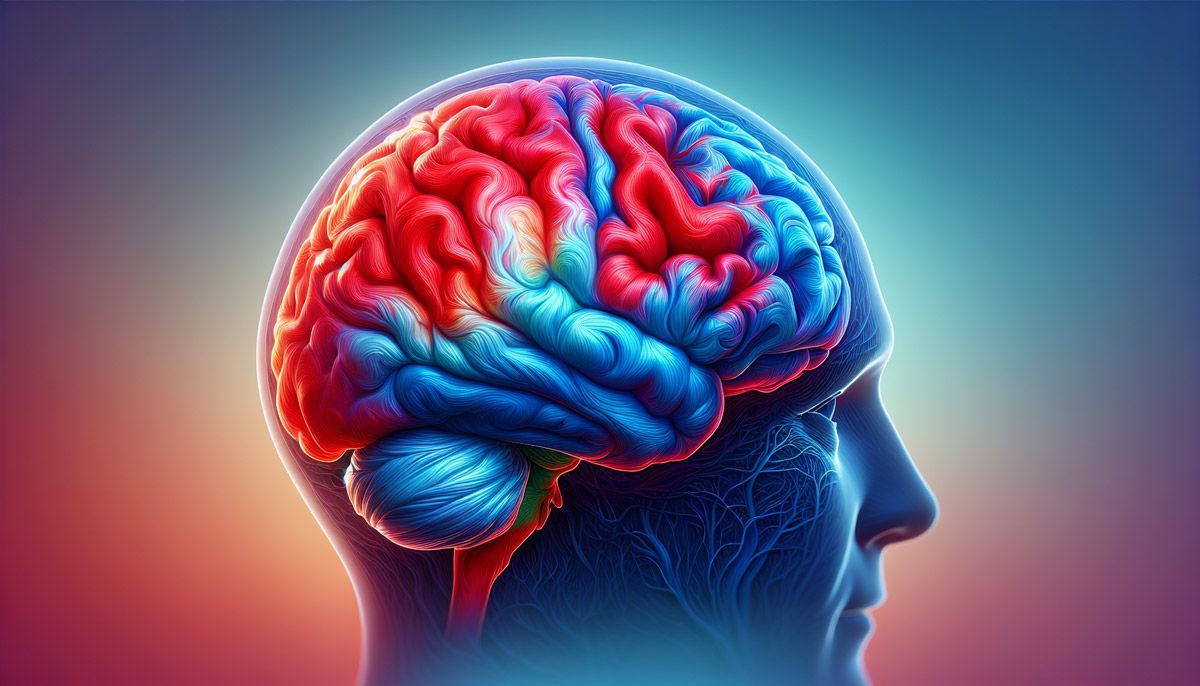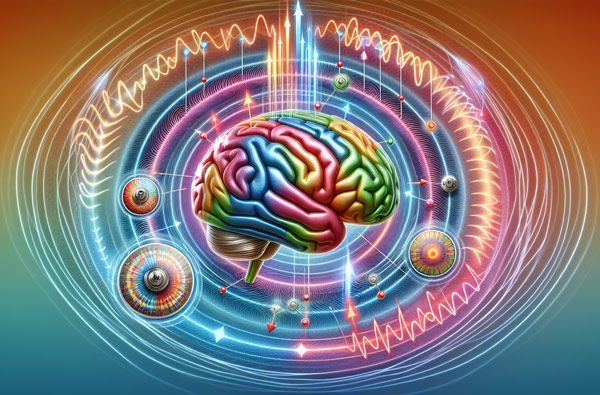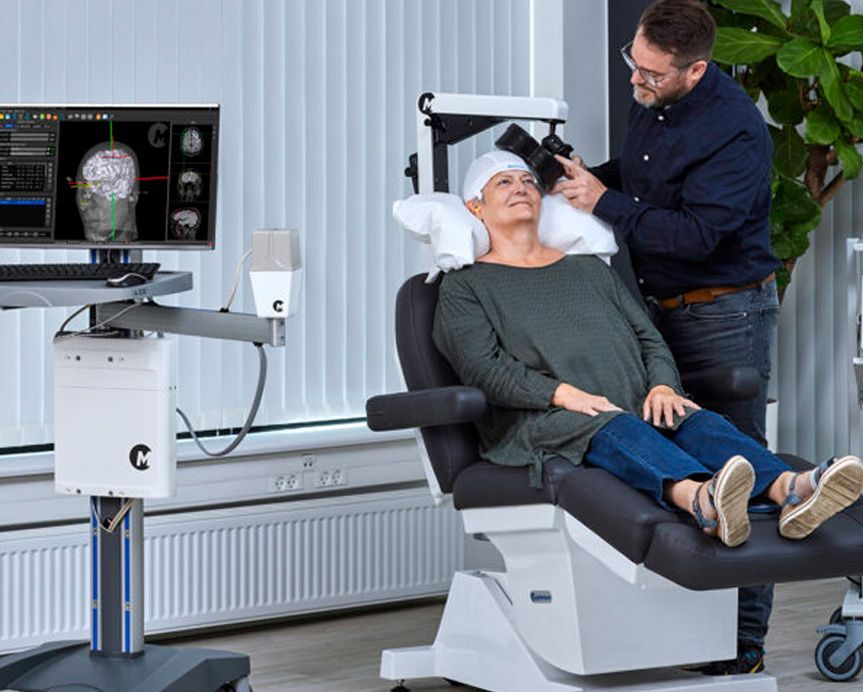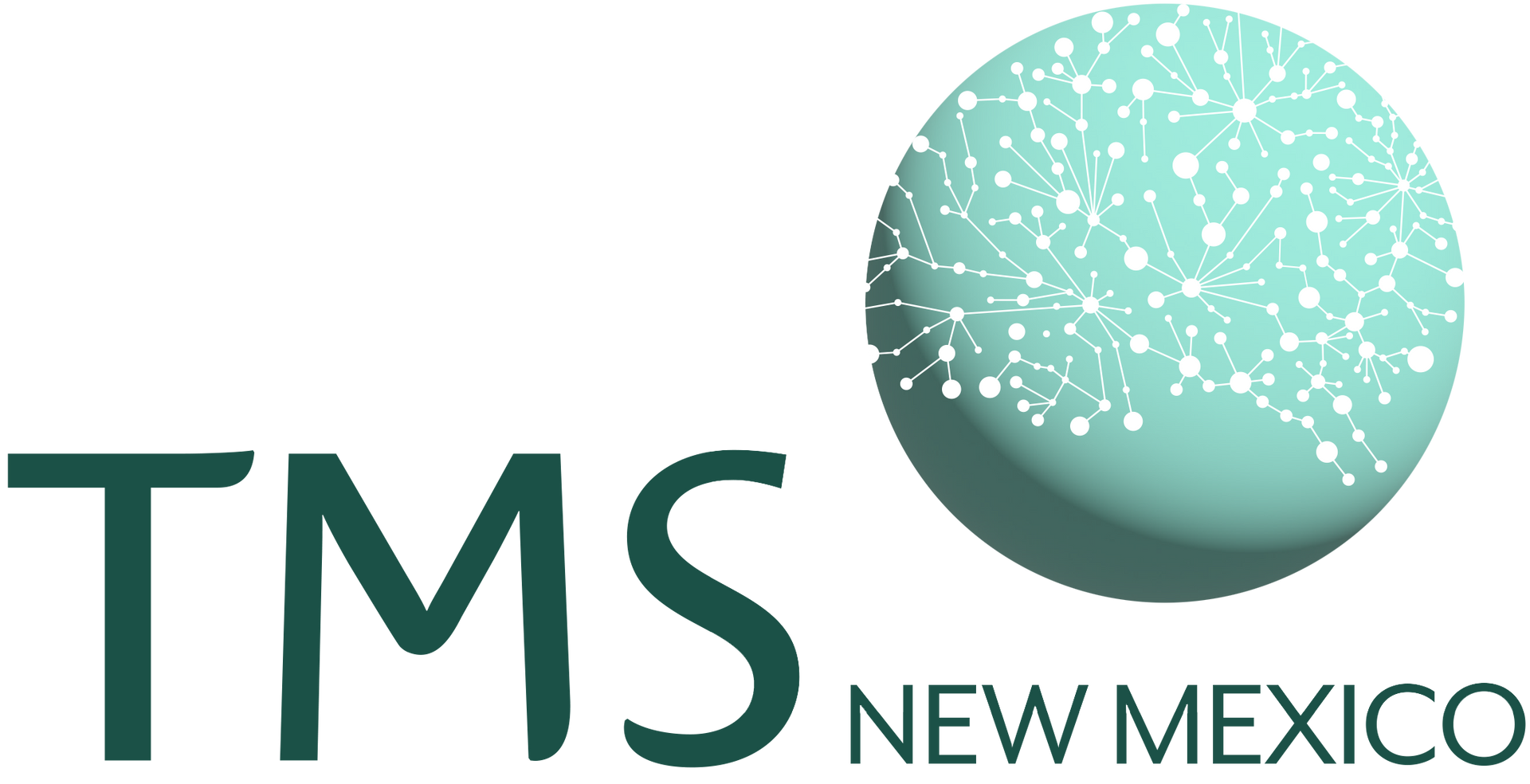300 Paseo De Peralta Suite 208, Santa Fe, NM 87501
Exploring the Benefits of TMS for Dementia & Alzheimer's Disease
Can Transcranial Magnetic Stimulation (TMS) offer hope for dementia or Alzheimer’s patients? This article explores how TMS for Alzheimer’s, a non-invasive brain stimulation therapy, might help slow cognitive decline and improve quality of life for those affected by Alzheimer’s disease or dementia.
Are you local to Santa Fe New Mexico and would like to try TMS therapy for dementia or cognitive aging support? Contact TMS New Mexico today to schedule a free consultation! Insurance does not currently cover this treatment but many patients are using TMS off-label or paying clinics directly. TMS New Mexico offers an interest free payment plan through the Care Credit medical credit card. Ask us how to apply.
Key Takeaways
- Transcranial Magnetic Stimulation (TMS) is a non-invasive therapy that shows promise in improving cognitive function and slowing cognitive decline in Alzheimer’s patients.
- Clinical trials indicate that TMS can stabilize cognitive ability by preventing declines in scores on assessments such as the Mini-Mental State Examination (MMSE), particularly when applied early in the disease progression.
- TMS is non-invasive and has a favorable safety profile compared to traditional Alzheimer’s medications, with fewer adverse effects, making it a potentially effective adjunctive treatment for cognitive and psychological symptoms in Alzheimer’s disease.

Understanding Alzheimer's Disease
Alzheimer’s disease is a progressive brain disorder characterized by the accumulation of harmful proteins, leading to brain cell death and cognitive decline. This condition affects approximately 6.5 million individuals aged 65 and older in the U.S., with a significant majority being over 75. The impact of Alzheimer’s extends beyond the individual, affecting families and caregivers who witness the gradual loss of a loved one’s memories and abilities.
In the early stages, Alzheimer’s disease presents with mild cognitive impairment, such as difficulty remembering recent events and conversations. These symptoms often go unnoticed or are attributed to normal aging, but they progressively worsen over time. As the disease advances, it affects memory, thinking, reasoning, and the ability to perform daily tasks. Patients may require assistance with activities of daily living, leading to increased dependency on caregivers.
Alzheimer’s disease patients experience changes in personality and behavior, such as mood swings, irritability, and social withdrawal. These behavioral and psychological symptoms can be distressing for both alzheimer’s disease patients and their families, adding to the emotional burden of the disease. In the later stages, severe cognitive impairment can result in complications like dehydration, malnutrition, and infection, potentially leading to death.
The progression of Alzheimer’s disease can be devastating, but early intervention and treatment can help manage symptoms and improve quality of life. Understanding the disease’s trajectory and recognizing early onset Alzheimer’s is crucial for timely diagnosis and intervention. Addressing mild cognitive impairment and amnestic mild cognitive impairment is essential in slowing the progression of Alzheimer’s dementia and improving outcomes for dementia patients.
As we delve deeper into the potential of TMS, it’s important to keep in mind the complex nature of Alzheimer’s disease and the multifaceted challenges faced by patients and their families.

What is Transcranial Magnetic Stimulation (TMS)?
Transcranial Magnetic Stimulation (TMS) is a brain stimulation therapy that utilizes magnetic fields to stimulate specific areas of the brain. Unlike traditional medications, TMS is a non-invasive technique that holds promise for improving cognitive function in Alzheimer’s patients. The procedure involves placing an electromagnetic coil against the head, which delivers magnetic pulses to targeted regions of the brain.
The effectiveness of TMS can vary based on several factors, including the frequency of stimulation and the specific brain regions targeted. Research has shown that TMS may help slow cognitive decline by enhancing cortical excitability and modulating brain activity. This non-invasive brain stimulation technique is not only relatively cheap and safe but also offers new diagnostic and therapeutic possibilities in treating dementia.
TMS therapy sessions typically involve the patient sitting comfortably in a chair while the magnetic coil is positioned near their head. The stimulation frequency and duration are carefully controlled to achieve optimal results. Repetitive Transcranial Magnetic Stimulation (rTMS) is a common form of TMS that involves multiple sessions over a period of time to reinforce the therapeutic effects. Additionally, rTMS treatment has shown promise in various clinical applications.
The non-invasive nature of TMS makes it an attractive option for patients who may not tolerate traditional drug therapies. It provides a safe and effective modality for addressing cognitive impairment without the systemic side effects often associated with medications. Moreover, TMS is continuously being enriched with new modalities and paradigms of stimulation, making it a versatile tool in the fight against Alzheimer’s disease.
Understanding the principles and mechanisms of TMS allows us to appreciate its potential as a groundbreaking treatment for Alzheimer’s disease. The scientific basis of TMS and its ability to modulate brain activity to improve cognitive functions in Alzheimer’s patients will be explored next.
The Science Behind TMS for Alzheimer's
Individuals with Alzheimer’s disease exhibit heightened cortical excitability and diminished inhibition compared to cognitively normal adults. This imbalance in brain activity contributes to the cognitive decline observed in Alzheimer’s patients. Transcranial Magnetic Stimulation (TMS) has emerged as a non-invasive technique that can enhance cognitive functions by modulating cortical excitability.
Repetitive Transcranial Magnetic Stimulation (rTMS) has shown better outcomes in cognitive function improvement than several drug therapies, achieving a higher probability of efficacy in clinical settings. In comparative studies, rTMS demonstrated superior efficacy over acetylcholinesterase inhibitors and NMDA receptor antagonists, which are key classes of Alzheimer’s medications. This highlights the potential of TMS as a more effective alternative for treating Alzheimer’s disease.
During TMS therapy sessions, patients generally sit in a comfortable chair while a magnetic coil is positioned near their head, delivering brief magnetic pulses to stimulate targeted areas of the brain. This process helps in testing cortical excitability and the functionality of brain connections, providing valuable insights into the pathophysiology of Alzheimer’s disease.
The unique ability of TMS to modulate cortical excitability and enhance brain connectivity makes it a promising tool for improving cognitive functions in Alzheimer’s patients. By targeting specific brain regions, TMS can potentially reverse or slow down the cognitive decline associated with Alzheimer’s disease. The science behind TMS underscores its potential as a groundbreaking treatment that could significantly improve the lives of Alzheimer’s patients.
The next part delves into clinical trials and studies that have explored the efficacy of TMS in treating Alzheimer’s disease. These studies provide essential evidence supporting the use of TMS as a viable treatment option for this debilitating condition.
Clinical Trials and Studies on TMS for Alzheimer's
Clinical trials and studies have played a crucial role in validating the efficacy of Transcranial Magnetic Stimulation (TMS) for Alzheimer’s disease. A recent large-scale trial involved 156 participants and examined both short-term and long-term effects of rTMS on Alzheimer’s patients. The study applied rTMS to the dorsolateral prefrontal cortex and compared two treatment durations: 2 weeks and 4 weeks.
The findings from these studies indicate that TMS can have a positive impact on cognitive abilities over time, potentially leading to significant improvement in cognitive improvement after treatment. Furthermore, TMS has shown potential in stabilizing or reducing the rate of cognitive decline in individuals with Alzheimer’s disease. This is evidenced by patients showing no significant decrease in Mini-Mental State Examination (MMSE) scores, suggesting that TMS can prevent a decline in cognitive performance.
Network meta-analysis reveals that rTMS has the highest likelihood of improving cognitive scores compared to both placebo and various drug treatments for Alzheimer’s. This highlights the significant potential of TMS as a therapeutic intervention for Alzheimer’s disease. Research also indicates that TMS may be most effective when applied early in the disease course, before significant neuronal loss occurs. This underscores the importance of early intervention with TMS to maximize its benefits.
TMS-derived measures provide insights into the pathophysiological changes associated with Alzheimer’s and could serve as diagnostic tools. These studies collectively demonstrate the potential of TMS to not only improve cognitive functions but also to serve as a valuable tool in diagnosing and understanding the progression of Alzheimer’s disease.
Evidence from clinical trials and studies is essential in understanding how TMS can improve cognitive function in Alzheimer’s patients. The next section will delve into the specific cognitive improvements that TMS can bring to Alzheimer’s patients.

How TMS Can Improve Cognitive Function in Alzheimer's Patients
One of the most promising aspects of Transcranial Magnetic Stimulation (TMS) in Alzheimer’s patients is its ability to sustain cognitive stability amid the disease’s progression. Research indicates that TMS can maintain stability in cognitive measures over time, potentially countering the expected decline. This is particularly important for Alzheimer’s patients, as maintaining cognitive function allows them to manage daily activities better and enhances their overall quality of life.
TMS offers a non-invasive treatment option that may provide significant benefits in maintaining cognitive function for Alzheimer’s disease patients. By targeting specific brain regions and modulating cortical excitability, TMS can help improve cognitive performance and slow down the cognitive decline associated with Alzheimer’s disease. Maintaining cognitive function is crucial for Alzheimer’s patients as it directly impacts their independence and daily activities.
The following subsections detail how TMS can specifically improve memory function, reduce cognitive decline, and alleviate behavioral and psychological symptoms in Alzheimer’s patients.
Memory Function
High-frequency TMS has been shown to be particularly effective in enhancing memory function in individuals with mild Alzheimer’s disease. By targeting the dorsolateral prefrontal cortex, TMS can improve memory function, as this area is involved in memory encoding. This targeted stimulation has shown potential in improving episodic memory and overall cognitive performance in Alzheimer’s patients.
Another promising area for TMS is the precuneus, which is involved in various aspects of memory and cognitive function. Studies have shown that targeting the precuneus with TMS can help preserve memory function, with patients maintaining stable cognitive scores throughout the treatment. This indicates that TMS can enhance synaptic plasticity and brain connectivity, leading to improved memory function in Alzheimer’s patients.
Transcranial Magnetic Stimulation (TMS) is being researched for its potential to enhance memory function in patients with Alzheimer’s disease. The ability to improve memory function can significantly impact the quality of life for Alzheimer’s patients, allowing them to retain important memories and better manage their daily activities.
Cognitive Decline
The application of TMS has shown promise in potentially reducing the rate of cognitive decline in Alzheimer’s patients. Cognitive decline is a hallmark symptom of Alzheimer’s disease, significantly affecting daily living and independence. By targeting specific brain regions, TMS can slow down cognitive and functional decline, helping patients maintain their cognitive function for a longer period.
Studies indicate that TMS may slow down cognitive and functional decline in Alzheimer’s patients, leading to significant improvements in cognitive performance. This is particularly important for patients in the early stages of Alzheimer’s, as early intervention can help preserve cognitive function and delay the progression of the disease.
Maintaining cognitive function is crucial for Alzheimer’s patients as it directly impacts their independence and ability to perform daily tasks. TMS offers a non-invasive treatment option that can help address mild cognitive impairment and slow down the cognitive decline associated with Alzheimer’s disease through cognitive training.
Behavioral and Psychological Symptoms
Clinical trials suggest that rTMS can provide lasting improvements in behavioral and psychological symptoms of dementia for weeks to months. Behavioral and psychological symptoms, such as depression and anxiety, are significant challenges for individuals with Alzheimer’s disease. These symptoms can exacerbate cognitive decline and significantly impact the quality of life for both patients and their caregivers.
The lasting effects of TMS treatment can help stabilize the mood and overall psychological well-being of Alzheimer’s patients. By targeting specific brain regions, TMS can reduce depressive symptoms and anxiety, leading to improved cognitive performance and overall quality of life.
TMS holds promise as a non-invasive treatment option that may significantly enhance the overall quality of life for those suffering from Alzheimer’s. By improving both cognitive function and behavioral and psychological symptoms, TMS offers a holistic approach to treating Alzheimer’s disease.
Comparing TMS with Other Alzheimer's Treatments
When evaluating the potential of Transcranial Magnetic Stimulation (TMS) for Alzheimer’s treatment, it’s essential to compare it with existing therapies. Traditional drug therapies, such as acetylcholinesterase inhibitors and NMDA receptor antagonists, are commonly used to manage Alzheimer’s symptoms. However, these medications often come with systemic side effects and are most effective only in the early stages of the disease.
TMS, on the other hand, is a non-invasive treatment with no systemic side effects, making it an appealing option for dementia patients. Repetitive Transcranial Magnetic Stimulation (rTMS) has been shown to effectively reduce cognitive impairment and behavioral symptoms in Alzheimer’s patients without the adverse reactions associated with drug therapies. This highlights the potential of TMS as a safer alternative for treating Alzheimer’s disease.
Moreover, TMS has been reported to significantly alleviate behavioral and psychological symptoms of dementia, such as depression and anxiety, which can indirectly support overall cognitive function. These improvements in mood and psychological well-being are crucial for enhancing the quality of life for Alzheimer’s patients and their caregivers.
The non-invasive nature of TMS, coupled with its ability to target specific brain regions and modulate cortical excitability, presents a unique alternative to traditional Alzheimer’s treatments. While current medications are limited in their effectiveness as the disease progresses, TMS offers a promising adjunctive treatment that can address both cognitive and emotional aspects of Alzheimer’s disease.
It’s important to consider the challenges and future directions for TMS as this innovative therapy continues to be explored. The next section will delve into the current limitations and the need for further research to fully realize the benefits of TMS for Alzheimer’s patients.
Challenges and Future Directions for TMS in Alzheimer's Treatment

Despite the promising potential of Transcranial Magnetic Stimulation (TMS) for Alzheimer’s treatment, there are several challenges that need to be addressed. Current research lacks robust evidence demonstrating that TMS provides significant clinical benefits over existing treatments for Alzheimer’s. This highlights the need for more comprehensive studies to establish the long-term efficacy and safety of TMS in treating Alzheimer’s disease.
One of the key challenges is the need to explore the neurobiological impacts of TMS on Alzheimer’s progression and its potential to modify underlying disease mechanisms. Understanding how TMS affects brain activity and neuronal health is crucial for optimizing treatment protocols and achieving better clinical outcomes.
Future TMS studies should focus on participants with verified neuroimaging or biomarkers to enhance diagnosis accuracy and ensure that the treatment is tailored to the specific needs of Alzheimer’s patients. This will help in identifying the most effective stimulation parameters and brain regions to target, ultimately improving the therapeutic efficacy of TMS.
Another challenge is the presence of comorbid depression in Alzheimer’s patients, which complicates the assessment of TMS’s cognitive benefits. Addressing these comorbid conditions and understanding their interaction with TMS therapy is essential for developing comprehensive treatment plans that can maximize the benefits for Alzheimer’s patients.
Continued research and innovation are needed to fully harness the potential of TMS for Alzheimer’s treatment. Insights into the safety, tolerability, and therapeutic benefits of TMS for Alzheimer’s patients will be discussed next.
Safety and Efficacy of TMS for Alzheimer's Patients
The safety and efficacy of Transcranial Magnetic Stimulation (TMS) have been extensively studied, revealing that it is generally well-tolerated among Alzheimer’s patients. A systematic review involving 143 studies indicated that serious adverse events related to TMS are infrequent, highlighting its favorable safety profile. This makes TMS a safe and effective modality for treating Alzheimer’s disease.
While the incidence of adverse reactions associated with repetitive Transcranial Magnetic Stimulation (rTMS) is generally low, some cases have reported mild side effects such as sleep disturbances and seizures. Patients may also experience mild discomfort at the site of stimulation, but serious side effects are rare. Higher frequency rTMS can lead to an increased risk of epilepsy, necessitating careful monitoring and adjustments in treatment parameters.
Comparatively, patients receiving rTMS reported fewer adverse events compared to those treated with conventional medications for Alzheimer’s. The mild side effects and low incidence of complications make TMS a promising option for enhancing cognitive function while minimizing the risks associated with pharmacological treatments.
TMS can assess cortical excitability and plasticity in patients with Alzheimer’s disease and mild cognitive impairment, providing valuable diagnostic insights that can guide treatment decisions. The potential sham effect, where sham treatment participants did not show cognitive decline at follow-up, also underscores the importance of rigorous study designs to accurately assess TMS’s therapeutic efficacy.
Overall, the safety and efficacy of TMS, combined with its potential benefits in enhancing cognitive function, make it a viable treatment option for Alzheimer’s patients. The next section will provide practical considerations for TMS therapy, offering guidance on how to implement this treatment effectively.
Practical Considerations for TMS Therapy
Implementing Transcranial Magnetic Stimulation (TMS) therapy involves several practical considerations to ensure its effectiveness and safety. TMS therapy typically involves daily sessions occurring five times a week, commonly referred to as repetitive TMS (rTMS). This intensive treatment schedule is designed to reinforce the therapeutic effects and achieve optimal cognitive improvement.
Personalized treatment plans are crucial for mitigating adverse effects and enhancing therapeutic outcomes. By tailoring rTMS protocols to individual patient profiles, clinicians can adjust stimulation parameters and target specific brain regions based on the patient’s unique needs and response to treatment. This personalized approach helps maximize the benefits of TMS therapy while minimizing potential risks.
Finding a qualified TMS provider is essential for ensuring the safe and effective administration of TMS therapy. Patients and caregivers should look for certified clinics or practitioners who have completed specialized training in TMS therapy. This ensures that the treatment is conducted by professionals with the necessary expertise to deliver high-quality care.
Caregivers play a vital role in the TMS therapy process. It’s recommended that caregivers accompany patients to consultations about TMS therapy to help discuss treatment options and address any concerns. Their involvement can provide emotional support and ensure that the patient adheres to the treatment schedule, thereby enhancing the overall effectiveness of the therapy.
This exploration of TMS for Alzheimer’s treatment highlights the significant promise of this innovative therapy. The next section will summarize the key points discussed and provide final thoughts on the potential of TMS in revolutionizing Alzheimer’s care.
Summary
In summary, Transcranial Magnetic Stimulation (TMS) represents a promising, non-invasive treatment option for Alzheimer’s disease, offering potential benefits in maintaining cognitive function and improving quality of life. By targeting specific brain regions and modulating cortical excitability, TMS can help slow cognitive decline and enhance memory function in Alzheimer’s patients.
The science behind TMS underscores its potential as a groundbreaking therapy, with clinical trials and studies providing essential evidence supporting its efficacy. TMS has shown significant improvements in cognitive performance and behavioral symptoms, making it a valuable tool in the fight against Alzheimer’s disease.
While there are challenges and limitations that need to be addressed, continued research and innovation are essential for fully realizing the benefits of TMS. Personalized treatment plans, rigorous study designs, and the involvement of qualified providers are crucial for optimizing TMS therapy and ensuring its success.
As we look towards the future, the potential of TMS to revolutionize Alzheimer’s treatment is evident. By embracing this innovative therapy, we can offer new hope for millions of individuals and families affected by Alzheimer’s disease. Together, we can pave the way for a brighter future in Alzheimer’s care.
What is Transcranial Magnetic Stimulation (TMS)?
Transcranial Magnetic Stimulation (TMS) is a non-invasive therapy that employs magnetic fields to target and stimulate specific brain areas, potentially enhancing cognitive function in individuals with Alzheimer's disease. Its application offers a promising avenue for therapeutic intervention in neurodegenerative conditions.
How does TMS compare to traditional Alzheimer's treatments?
TMS is advantageous over traditional Alzheimer's treatments as it is non-invasive and lacks systemic side effects, demonstrating greater potential in alleviating cognitive impairment and behavioral symptoms. Consequently, TMS may offer a promising alternative to conventional drug therapies.
What are the safety considerations for TMS therapy?
TMS therapy is considered safe, with mild side effects like sleep disturbances and localized discomfort being the most common. Serious adverse reactions are rare, making it a well-tolerated treatment option.
How often are TMS therapy sessions conducted?
TMS therapy sessions are generally conducted daily, five times a week, to maximize therapeutic benefits and cognitive improvement. In the end, it's up to the provider and patient to determine the frequency and number of sessions needed.
What role do caregivers play in TMS therapy?
Caregivers play a vital role in TMS therapy by providing emotional support and ensuring adherence to the treatment schedule, which enhances the overall effectiveness of the therapy. Their involvement is essential for optimal patient outcomes. Local to Santa Fe New Mexico? We can help!
Cited Sources:
- Wexler, Anna et al. “Off-Label Promotion of Transcranial Magnetic Stimulation on Provider Websites.” Brain stimulation vol. 14,3 (2021): 723-724. doi:10.1016/j.brs.2021.04.013
- Antczak, Jakub et al. “Transcranial Magnetic Stimulation as a Diagnostic and Therapeutic Tool in Various Types of Dementia.” Journal of clinical medicine vol. 10,13 2875. 28 Jun. 2021, doi:10.3390/jcm10132875
- Bretecher CA, Verot A, Teschuk JM, Uehara MA, Fitzgerald PB, Koski L, Lithgow BJ, Moussavi Z. Quantitative Analysis of Factors of Attrition in a Double-blind rTMS Study for Alzheimer Treatment. Alzheimer Dis Assoc Disord. 2024 Aug 8. doi: 10.1097/WAD.0000000000000633. Epub ahead of print. PMID: 39115246.
- Cappon, Davide et al. “Transcranial magnetic stimulation (TMS) for geriatric depression.” Ageing research reviews vol. 74 (2022): 101531. doi:10.1016/j.arr.2021.101531

HELPFUL LINKS TO LEARN MORE
Book an appointment at our mental health clinic in Santa Fe, New Mexico. You are not alone!

READY TO GET STARTED?
At TMS New Mexico of Santa Fe, we specialize in advanced neurocare and psychiatric services aimed at improving mental health for residents of Santa Fe County and Los Alamos County. Our tailored treatment plans are designed to specifically target depression, empowering our clients to lead more fulfilling lives. If you or a loved one struggles with depression, anxiety, OCD, PTSD, or another mental health issue, we may be able to help.
SERVICE AREAS
- SANTA FE
- CAÑONCITO
- SETON VILLAGE
- GALISTEO
- GLORIETTA
- LA CLENEGA
- LOS CERRILLOS
- MADRID
- TESUQUE
- CHUPADERO
- POJOAQUE
- LOS ALMOS
- WHITE ROCK
- NAMBE
- PECOS
- SANTA FE
- CAÑONCITO
- SETON VILLAGE
- GALISTEO
- GLORIETTA
- LA CLENEGA
- LOS CERRILLOS
- MADRID
- TESUQUE
- CHUPADERO
- POJOAQUE
- LOS ALAMOS
- WHITE ROCK
- NAMBE
- PECOS
- TAOS
MAIN LINKS
CONTACT
300 Paseo De Peralta Suite 208, Santa Fe, NM 87501
- Mon - Fri
- -
- Sat - Sun
- Closed
COMPANY
NPI# 1811753767

All Rights Reserved | TMS New Mexico


